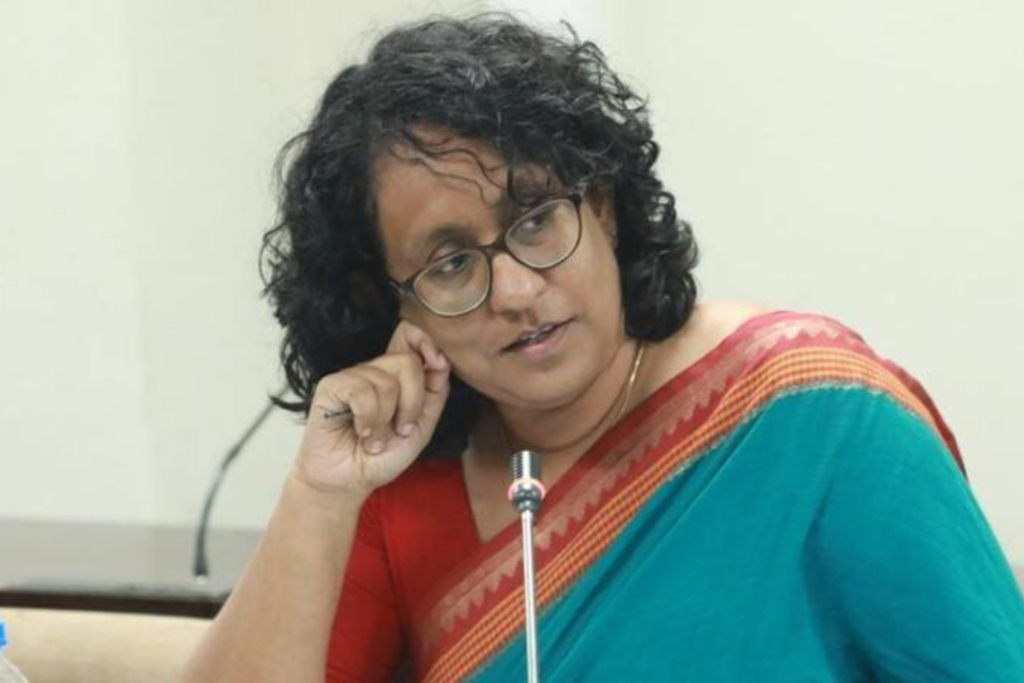Sri Lanka, a tiny island nation with ancient culture and untouched landscapes, was the first country in the world to appoint a woman as prime minister.
Dr Harini Amarasuriya is now the third woman to become prime minister in Sri Lanka following Sirimavo Bandaranaike (first appointed in 1960) and Chandrika Kumartunga (appointed in 1994 before becoming the country’s first and only woman president).
Dr Amarasuriya and the National People Power (NPP) coalition won the recent election on a campaign promise to clean up corruption and bring systemic change.
Their vision for the country has been criticised by some for being idealistic.
When asked about her party’s lack of experience in running a country, she responded:
“Well, we don’t have experience with making the country bankrupt for sure, but we will gain experience in building the country.”
Before entering politics, Dr Amarasuriya was a senior lecturer with research interests in human rights, constitutional reforms, political dissent and activism.
She has also been a Board Member of the Law and Society Trust, the Centre for Women’s Research and mental health organisation Nest.
Sri Lanka is a multi-party democracy led by the president as head of state and government, with the support of their deputy, the prime minister.
Dr Amarasuriya steps into this role at a critical time for the country, standing next to newly elected President “A.N.D.”, Anura Kumara Dissanayake.
A couple of years ago, the nation suffered its worst economic crisis in decades with inflation peaking at nearly 74 per cent in 2022 leading to mass protests, during which thousands walked into the residence of self-exiled former President Gotabaya Rajapaksa to sleep, swim and eat at the presidential palace for days.
It came in a season of global unrest with the COVID-19 pandemic ripping through as locals tried to recover from the tragic Easter bombings in 2019.
A decade prior to this, the country closed the door on a 26-year war with many still looking for loved ones who disappeared.
Adding to the country’s woes have been concerns over a growing culture of corruption amongst the powers that be.
Speaking to NDTV, Dr Amarasuriya said people voting in this election were thinking about the economy but systemic issues around this have been a greater concern.
“People recognise or want to understand better why the economic crisis took place,” she said.
“Why did this happen in this country? There is a lot of discussion around the need for political reform … you cannot separate the two issues: the political reform plus the economic reform.
“So yes, people are wanting relief from their day to day issues on the rising cost of living, the health and education crisis, but more and more people recognise that the cause of this has to be addressed.”
She says the country cannot move forward “while the system that created this economic crisis remains intact”.
In 2020, Gain Integrity reported a high risk of corruption in Sri Lanka’s judicial system, public procurement and customs administration with bribe solicitation by government officials, nepotism and cronyism being among the most common forms of corruption.
It’s an area Dr Amarasuriya and the NPP have been outspoken about.
“If we are to fix the economy, we have to recover in a sustainable way, we need to deal with corruption, we need to deal with nepotism, we need to deal with a political system that is out of touch with people,” she said.
“These issues need to be resolved if we are to sustainably build the economy.”
It appears she’s not alone in this thinking, with the NPP’s victory seen widely as a rejection of those who previously held power.
The recent result brings a dramatic turn of events for the party, which won just three per cent of the vote in the last presidential election.
As The Guardian’s Hannah Ellis-Petersen puts it, it’s a watershed moment for the NPP.
Dr Amarasuriya and her party have been swift in their plans to take the country in a new direction.
Just days after the election, the new president has dissolved the 225-member parliament calling for a snap election on November 14.
The new government will also have to navigate a way forward as the country continues its economic recovery and renegotiates a $2.9 billion bail out from the International Monetary Fund.
“Our opponents keep saying the same thing over and over again [about our economic policy] but they don’t really engage with the substance of it,” said Dr Amarasuriya.
“We’re talking about continuing with the debt restructuring process, we’re talking about what needs to happen to get the economy out of recession.
“We’re talking about stronger social protection measures, and we’re talking about rooting out corruption so that we can actually attract the kind of investments and create the type of private sector, which will help our economy grow.
“I don’t see what’s so utopian about that. Those are things that are essential for our economic recovery.”
There is hope in conversations among those who voted but whether Sri Lanka can rejoice in the change of leadership for long, time will tell.


